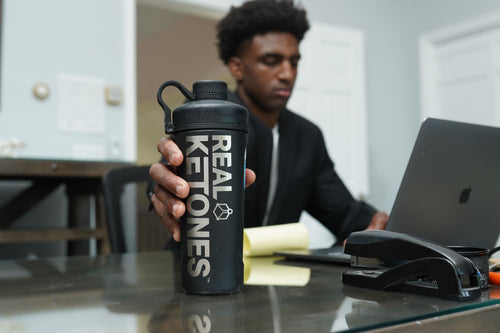A lot of people play with the idea of a keto lifestyle without ever taking the plunge. What’s holding them back? For some, it’s cholesterol.
Most of us are aware that cholesterol comes from fat. Over time, fatty foods can cause bad cholesterol to build up, clogging the arteries and putting a strain on the heart, which has to work harder to pump blood throughout the body.
If cholesterol comes from fat, it stands to reason that because the keto diet is high in fat, it must be bad for cholesterol levels. Right?
Not quite.
The idea that going keto can lead to high cholesterol—and jeopardize heart health over time—is a common misconception. Current studies into the effects of a low-carb, high-fat diet on cholesterol and heart health paint a drastically different picture.
According to these scientific sources, keto might actually be the tool you’ve been looking for to improve your cardiovascular health. How? Read this Ketogenic diet and cholesterol blog post to find out.
BREAKING DOWN FAT: FROM TRIGLYCERIDES TO CHOLESTEROL
In order to understand the research, it’s important to first understand the various roles that fat, cholesterol, and “helper” molecules called lipoproteins play in your body.
Along with protein and carbohydrates, fats—formally known as lipids—are one of the major macromolecules that the body needs to carry out important functions, for instance the storage of nutrients. That’s right, fat isn’t all bad. Your body actually needs fat to survive.
In the human body, there are two types of fat:
1. Triglycerides. When you eat, your body converts the calories it doesn’t need right away into triglycerides. This includes calories that come from carbs.
Triglycerides are long-chain fatty acids that are stored in fat; they can be broken down and used as a source of energy when the body needs them.
2. Cholesterol. Cholesterol has a bad reputation, but the truth is that it plays a crucial role in the body. This waxy compound forms a structural component of cells, and can be found in the membrane of every single cell in the human body.
Cholesterol is also implicated in nutrient absorption and the manufacturing of important hormones, including estrogen and testosterone. In the human body, 75% of cholesterol is synthesized in the liver, while the rest comes from food sources such as red meat, poultry, and dairy.
All fat molecules, including cholesterol and triglycerides, are non-polar, which means they repel water. As you’ve probably noticed, cleaning a greasy or oily pan with only water won’t get you very far. Why? Because fats and water don’t mix. So what does this mean for fats in the body?
Human blood is just under 80% water. Fat needs help moving through the bloodstream. That’s where lipoproteins come in. Lipoproteins are special carrier molecules that transport fat through the bloodstream.
Not all lipoproteins are created equal. When it comes to testing for cholesterol, doctors tend to focus on two types of lipoproteins:
• High-density lipoproteins (HDL)
• Low-density lipoproteins (LDL)
These lipoproteins are important because they determine how cholesterol is used. You might have heard that there are “good” and “bad” types cholesterol. But in fact, it’s the cholesterol transporters that create the positive or negative effect in the body.
During a standard cholesterol test, doctors also measure blood triglycerides, which we discussed above. High triglyceride levels are a strong risk factor for illnesses such as heart disease, stroke, and diabetes.
Let’s take a closer look at the role of HDL, LDL, and triglycerides in the body in order to understand how the keto lifestyle affects each one.
HDL CHOLESTEROL = “GOOD CHOLESTEROL”
Frequently referred to as “good cholesterol,” high-density lipoproteins transport cholesterol around the body while also scavenging for unused cholesterol and returning it to the liver. That’s how HDL prevents the buildup of cholesterol in the arteries, and ultimately protects cardiovascular health.
You want high levels of HDL, which have been shown to reduce the risk of cardiovascular disease. The opposite is also true: low levels of HDL cholesterol are associated with increased risk of heart disease.
Studies have shown that low-carb diets trigger dramatic increases in heart-healthy HDL. Surprisingly, HDL levels increase only moderately—and in some cases, they even go down—on low-fat diets.
LDL CHOLESTEROL = “BAD CHOLESTEROL”
If HDL collects cholesterol and returns it to the liver, LDL does the opposite. It’s responsible for delivering cholesterol to the cells so that it can be used for functions such as cell membranes and hormone synthesis.
Where’s the problem? Too much circulating LDL cholesterol can build up, forming plaque—a thick, solid deposit that narrows arteries. This condition is called atherosclerosis.
If left untreated, atherosclerosis can cause complications such as chest pain, heart attack, and stroke.
Risk factors for developing high LDL cholesterol include obesity, lack of exercise, smoking, diabetes, large waist circumference, and diets high in saturated and/or trans fats.
On keto, you should be doing your best to avoid trans fats, which come from processed or fried fatty foods. But saturated fats found in butter, meat, and eggs are a cornerstone of the diet.
SO, WILL THEY INCREASE YOUR LDL CHOLESTEROL?
Research has yielded varying results. Some studies have found that low-carb diets decreased LDL levels, while others reported that LDL levels stayed the same or even increased on a low-carb diet.
One thing is true: When it comes to LDL cholesterol, the picture is more complex. Scientists have pointed out that different types of LDL have different effects in the body. In particular, researchers have pinpointed that the size of LDL particles is significant.
Smaller LDL particles are associated with a higher risk of heart disease, while larger particles are associated with lower heart disease risk. One explanation suggests that small LDL particles are more likely to get stuck in the walls of the blood vessels and buildup over time, contributing to atherosclerosis.
The good news? The low-carb keto lifestyle consistently produce large LDL particles. There may even be a logical explanation as to why some studies show increases in LDL levels on low-carb diets. It’s because larger particles weigh more than smaller particles, and cholesterol tests measure by weight per deciliter of blood.
High-carb diets do the opposite, producing a larger percentage of small LDL particles in certain individuals. When LDL appears to go down on a high-carb diet, it could merely be the effect of lighter particles.
Of course, that doesn’t completely rule out the possibility that some people may experience increases in LDL on a low-carb, high-fat diet.
If you want to keep an eye on the size of your LDL particles, you can do so by monitoring your triglycerides. Elevated triglycerides are strongly correlated with small LDL particles. If your blood triglyceride levels are low, you probably have larger LDL particles.
TRIGLYCERIDES
Speaking of triglycerides, they’re a risk factor for cardiovascular disease and stroke—that’s why doctors test for them in standard cholesterol tests.
Triglycerides are fats, but believe it or not, elevated levels are strongly related to excess carb consumption. That’s especially true in the case of simple sugars, such as fructose.
So, it’s no surprise that cutting down on carbs causes blood triglyceride levels to plummet. These results are pretty consistent across the board. Physicians may even recommend a low-carb diet to patients who need to lower their triglyceride levels.
THE BOTTOM LINE?
A low-carb, high-fat lifestyle such as ketogenic appears to have a positive impact on HDL and LDL, as well as triglycerides. Keto may be a useful tool to improve long-term heart health. Of course, that doesn’t mean the results are the same for everyone.
Still, if you have high cholesterol or are taking blood statins to lower your cholesterol, you might consider talking to a specialist about transitioning to a keto lifestyle.

 LEARN
LEARN
 ACCOUNT
ACCOUNT
 CART
CART





